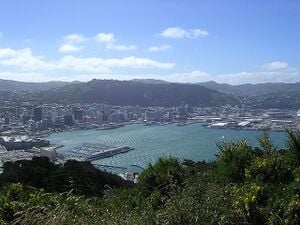
 The Māori climate activist breaking legal barriers to bring corporate giants to court, theguardian.com (Mar 06, 2024)
The Māori climate activist breaking legal barriers to bring corporate giants to court, theguardian.com (Mar 06, 2024)  Climate change is fanning the flames of NZ’s wildfire future. Port Hills is only the beginning, theconversation.com (Feb 22, 2024)
Climate change is fanning the flames of NZ’s wildfire future. Port Hills is only the beginning, theconversation.com (Feb 22, 2024)  One of NZ’s most contentious climate cases is moving forward. And the world is watching, theconversation.com (Feb 12, 2024)
One of NZ’s most contentious climate cases is moving forward. And the world is watching, theconversation.com (Feb 12, 2024)
This page is the beginnings of a portal for New Zealand community action. It focuses mainly on New Zealand community action topics. Separate pages cover Resources New Zealand, and New Zealand news
Climate action[edit | edit source]
Government website: Climate change information
wikipedia:Climate change in New Zealand
Biodiversity[edit | edit source]
wikipedia:Biodiversity of New Zealand
Environment quality[edit | edit source]
Government website: Water quality
Community involvement[edit | edit source]
Arts, sport and culture[edit | edit source]
Coasts[edit | edit source]
Community energy[edit | edit source]
Energy Efficiency & Conservation Authority - Sustainability Trust
Cycling activism[edit | edit source]
Critical Mass bicycle rides in New Zealand - Cycling Advocates' Network
Ethical consumerism[edit | edit source]
Food activism[edit | edit source]
Ooooby. Social network. Ooooby stands for Out of our own back yards.
Kai Rakau Project: Establishing a large collection of mainly fruit and nut bearing trees for the purpose of education, protection and heritage. facebook page
Food waste in New Zealand W
Reduce, reuse, repair and recycle[edit | edit source]
eDay (Wikipedia), annual New Zealand initiative, started by Computer Access New Zealand (CANZ), aimed to raise awareness of the potential dangers associated with electronic waste and to offer the opportunity for such waste to be disposed of in an environmentally friendly fashion.
Sustainable transport activism[edit | edit source]
Campaign for Better Transport (New Zealand), Auckland based advocacy group that promotes alternatives to the private car, including public transport, cycling and walking. W
Walking: Living Streets Aotearoa, Christchurch 360 Trail
About New Zealand[edit | edit source]
New Zealand (Māori: Aotearoa [aɔˈtɛaɾɔa]) is an island country in the southwestern Pacific Ocean. It consists of two main landmasses—the North Island (Te Ika-a-Māui) and the South Island (Te Waipounamu)—and over 700 smaller islands. It is the sixth-largest island country by area and lies east of Australia across the Tasman Sea and south of the islands of New Caledonia, Fiji, and Tonga. The country's varied topography and sharp mountain peaks, including the Southern Alps, owe much to tectonic uplift and volcanic eruptions. New Zealand's capital city is Wellington, and its most populous city is Auckland.
The islands of New Zealand were the last large habitable land to be settled by humans. Between about 1280 and 1350, Polynesians began to settle in the islands and then subsequently developed a distinctive Māori culture. In 1642, the Dutch explorer Abel Tasman became the first European to sight and record New Zealand. In 1769 the British explorer Captain James Cook became the first European to set foot on and map New Zealand. In 1840, representatives of the United Kingdom and Māori chiefs signed the Treaty of Waitangi which paved the way for Britain's declaration of sovereignty later that year and the establishment of the Crown Colony of New Zealand in 1841. Subsequently, a series of conflicts between the colonial government and Māori tribes resulted in the alienation and confiscation of large amounts of Māori land. New Zealand became a dominion in 1907; it gained full statutory independence in 1947, retaining the monarch as head of state. Today, the majority of New Zealand's population of 5.25 million is of European descent; the indigenous Māori are the largest minority, followed by Asians and Pasifika. Reflecting this, New Zealand's culture is mainly derived from Māori and early British settlers, with recent broadening of culture arising from increased immigration. The official languages are English, Māori, and New Zealand Sign Language, with the local dialect of English being dominant.
Near you[edit | edit source]
External links


